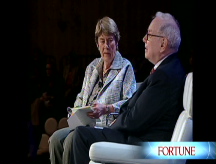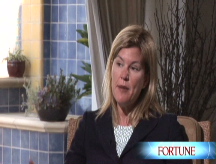On housing, McCain takes sharp left turn
Republican nominee's mortgage plan bypasses the free market in favor of big government.
WASHINGTON (Fortune) -- Minutes into last night's presidential debate, the already listing ship of free-market Republicanism groaned, keeled over and began a long journey to the bottom of the political seas.
John McCain told us he wants the federal government to nationalize much of the home mortgage industry, buying up loans from strained homeowners and renegotiating new, more affordable terms.
Neither moderator Tom Brokaw nor opponent Barack Obama followed up on McCain's latest Hail Mary by asking him what this program would cost. But the price tag can be found in the fourth paragraph of a campaign background sheet on what's dubbed the McCain Resurgence Plan. "The direct cost...would be roughly $300 billion because the purchase of mortgages would relieve homeowners of 'negative equity' in some homes."
"I would order the Secretary of the Treasury to immediately buy up the bad home loan mortgages in America and renegotiate at the... diminished value of those homes and let people be able to make those payments and stay in their homes," the Republican presidential nominee said.
"Is it expensive? Yes. But we all know, my friends, until we stabilize home values in America, we're never going to start turning around and creating jobs and fixing our economy, and we've got to give some trust and confidence back to America."
According to economic adviser Douglas Holtz-Eakin, McCain intends to carve these funds out of the $700 billion rescue plan, a recent housing bill, and the U.S. government's conservatorship of mortgage guarantors Fannie Mae and Freddie Mac. But the campaign fact sheet says, "It may be necessary for Congress to raise the overall borrowing limit."
"We were playing it safe. We did that as a place-holder," Holtz-Eakin told Fortune, adding "we hope" the already authorized programs will cover the costs.
The new mortgages would be fixed at rates and terms "manageable for the homeowner" and would be guaranteed by the Federal Housing Administration, said the campaign.
McCain apparently decided that the 2008 Housing and Economic Recovery Act to help 400,000 homeowners in danger of losing their homes wasn't enough. Under that plan, which McCain did not cast a vote on, the FHA would insure mortgages that lenders voluntarily renegotiate. McCain's plan is aimed at people who aren't about to default, according to Holtz-Eakin. In fact, "it's preferable for people if they don't get to that level of distress," he told reporters on a morning conference call.
The notion leaves conservatives cold.
"It's a great idea...for everyone who bought overpriced homes with Adjustable Rate Mortgages," writes blogger Michelle Malkin. "Those who rented or bought within their means or locked into fixed-rate loans that they can afford are out of luck, naturally." As Malkin notes, if Obama had proposed this last night, Republicans would have denounced him as a socialist.
But McCain was eager to claim ownership of his new $300 billion baby. "It's my proposal," he insisted. "It's not Senator Obama's proposal, it's not President Bush's proposal. But I know how to get America working again, restore our economy and take care of working Americans."
In fact, McCain's proposal is similar to ones promoted by Hillary Clinton, Obama and liberal think tanks.
A more limited version has been proposed in the past by McCain and has bounced around in conservative quarters: Economist Martin Feldstein proposes offering any homeowner the opportunity to replace 20 percent of his or her mortgage with a low-interest government loan, up to $80,000. (The idea, which got an airing in The Wall Street Journal, was denounced on some free-market blogs, I should note.)
McCain's massive new proposal, though, smells suspiciously like a last-minute campaign need for a debate headline. Holtz-Eakin said he doesn't know how many homeowners would seek help, so it's not clear where the $300 billion price tag came from.
And the campaign is equally fuzzy about what spending this will displace - and the plan's impact on Treasury's current plan to purchase mortgage-backed securities. Holtz-Eakin said he hopes that a widespread government purchase of mortgages - a bottom-up approach - will increase the value of securities that Treasury had planned to buy.
McCain's proposal drew a sharp rebuke from the conservative National Review's Mark Steyn: "We talk of 'keeping people in their home,' but in what sense are they 'their homes'? Many of these home 'owners' obtained such ridiculous mortgages that they have minimal equity in them: Losing 'their homes' is, in that sense, little more in cash terms than losing the security deposit on your rental apartment. ... I'd rather leave it to the market."
Despite the possibility that Congress may need to raise the debt limit to help pay for his plan, McCain last night said (as he did in the first debate) that he would freeze nonmilitary spending to offset the cost of the $700 billion rescue plan. And while ready to intervene big time in the housing crisis, the Republican asserted that Obama's universal health care plan would mean government intrusion in a sector best left to the free market.
That kind of ideological impurity is one reason McCain has such an iffy relationship with his party's conservative wing. And just to confuse matters further, McCain told last night's audience he'd like as his Treasury secretary none other than Warren Buffett - an Obama adviser and a staunch opponent of the Bush tax cuts that McCain originally opposed and now says he wants to extend. (McCain's runner-up was more predictable - former Ebay (EBAY, Fortune 500) chief Meg Whitman. Sorry, Mitt.)
In the cadence of Sarah Palin: God bless the man. Just when you think you've got John McCain all figured out, he goes out and bags a big ol' moose to bring home.
Should we be looking for more surprises after it becomes clear that debate No. 2 didn't help McCain's sinking standing in the polls?
-
 The retail giant tops the Fortune 500 for the second year in a row. Who else made the list? More
The retail giant tops the Fortune 500 for the second year in a row. Who else made the list? More -
 This group of companies is all about social networking to connect with their customers. More
This group of companies is all about social networking to connect with their customers. More -
 The fight over the cholesterol medication is keeping a generic version from hitting the market. More
The fight over the cholesterol medication is keeping a generic version from hitting the market. More -
 Bin Laden may be dead, but the terrorist group he led doesn't need his money. More
Bin Laden may be dead, but the terrorist group he led doesn't need his money. More -
 U.S. real estate might be a mess, but in other parts of the world, home prices are jumping. More
U.S. real estate might be a mess, but in other parts of the world, home prices are jumping. More -
 Libya's output is a fraction of global production, but it's crucial to the nation's economy. More
Libya's output is a fraction of global production, but it's crucial to the nation's economy. More -
 Once rates start to rise, things could get ugly fast for our neighbors to the north. More
Once rates start to rise, things could get ugly fast for our neighbors to the north. More









